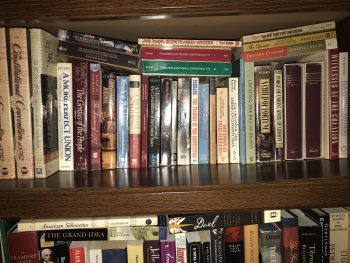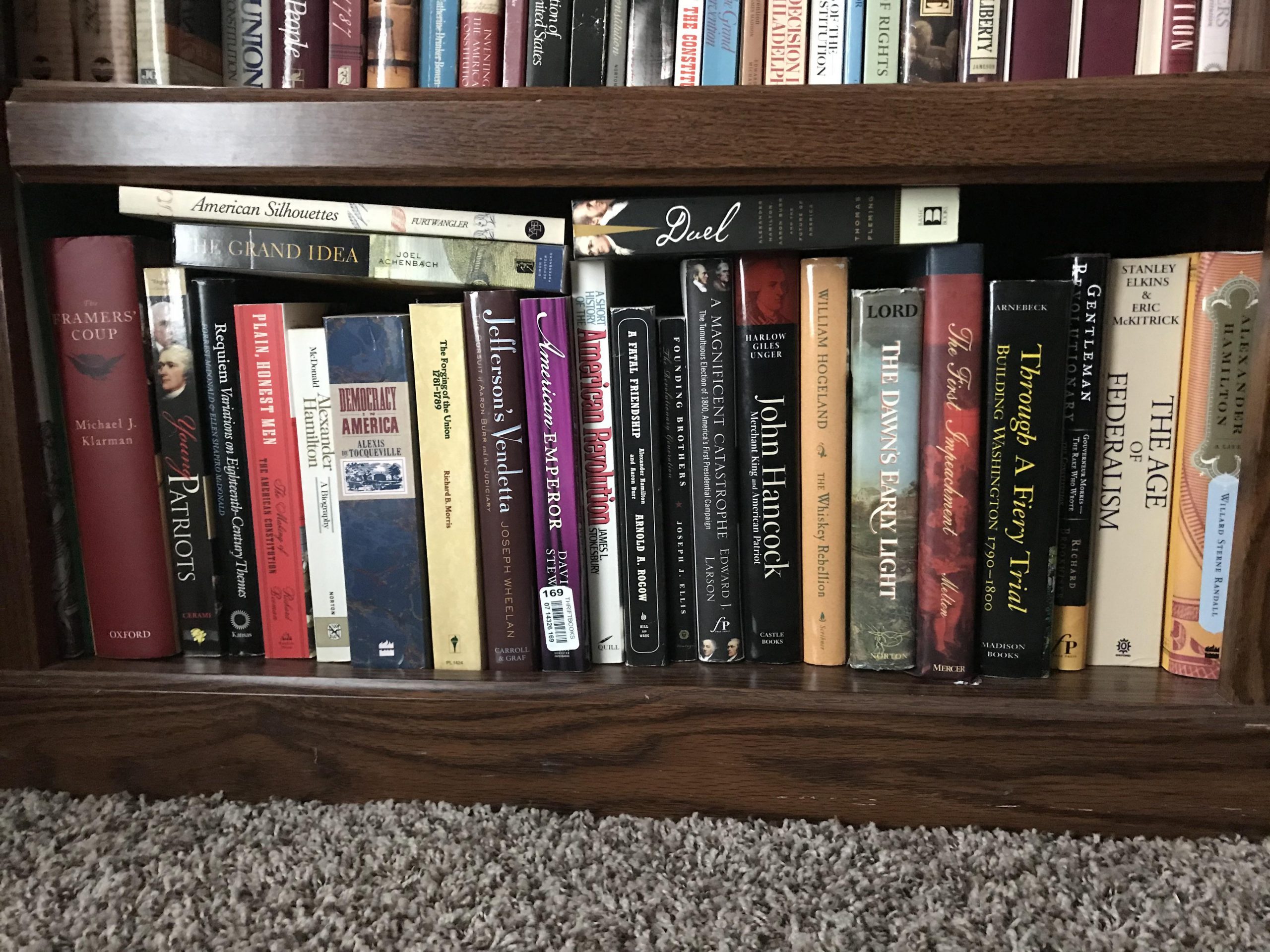Another Shelfie (#3): I Never get your limits, Byrne. There are Unexplored Possibilities…

I’ve done two posts here with Sherlock Holmes shelfies. If you missed those (shame on you!), I’ve been posting shelfies, with comments on some of the books, over in a bookshelf subreddit. With over 2,000 physical books, I’ve got a lot of shelves. The two shelfies I’ve done BG posts on, were Sherlock Holmes shelfies. No surprise there.
I have a Poly Sci undergrad, and I’m interested in some different areas of history. One that I have been interested in since my college days is the Constitutional Convention of 1787. My library is pretty impressive for just ‘some guy.’
So, I did a shelfie of my books on the Convention. Directly below that shelf is one with mostly-related books from that Founders Era. Together, there’s some pretty good stuff on the topic. So, here are my two shelfies, with a fair amount of commentary on most of the books.
I LOVE reading about the Constitutional Convention of 1787, and would spend time with these shelves if I wasn’t caught up in reading so much other stuff. I try to read/re-read something in this area every several years, at least.
THE CONSTITUTIONAL CONVENTION OF 1787
I read Catherine Drinker Bowen’s Miracle in Philadelphia as a Poly Sci undergrad. It was one of those books that sets you on a path for the rest of your life (The Iliad is another). I have amassed quite the library for the American Constitutional Convention of 1787.
The two-set encyclopedia on the left is a terrific resource, which is also an online reference.
The Men Behind the Nation is a cool coffee-table book on the Founding Fathers.
Mostly arranged by height, on to a bunch of books on the Convention itself:
Peter’s A More Perfect Union is one of my favorites. Good info, but reads easy.
Mee’s’ The Genius of the People is in the same category.
Stewart’s The Summer of 1787 is a relatively more recent entry (it’s not as popular a topic in the 21st century as it was in the 20th). I liked it.
I REALLY like Daniel St. John’s Constitutional Journal. It’s told as a day-to-day account by a newspaper reporter at the Convention. Cool book! There are two more that follow it – coming shortly.
Miracle at Philadelphia – this is one of the foundational books of my reading life.
I wasn’t too crazy about Berkin’s A Brilliant Solution. It was okay, but I never re-read it (I’ve read the majority of these more than once).
A lot of folks don’t buy into Charles Beard’s An Economic Interpretation of the Constitution of the United States, but it’s certainly a classic. And you’d have to be pretty naive to think delegates weren’t at least a little interested in their own economic well-being.
Forrest McDonald’s We the People is another ‘economic origins of the Constitution’ look.
McDonald’s Charles Beard and the Constitution is his analysis of Beard’s original. All three of these books are of interest.
I had to use a flash, which kinda blotted out the top of Carl Van Doren’s classic, The Great Rehearsal: The Story of the Making and Ratifying of the Constitution. This one is 75 years old.
Max Farrand’s The Framing of the Constitution of the United States was published in 1918 and is one of the building blocks on the subject: Perhaps THE foundation stone.
Clinton Rossiter’s 1787: The Grand Convention reads smoothly. I like this one as a refresher.
You can find James Madison’s Notes, online. Larson and Winship’s book puts them in a narrative, easier-to-digest format.
The Collier brothers’ book, Decision in Philadelphia, is a favorite among books written in the past forty years. I liked it well enough, but it’s not in my Top Five. I have also listened to it as an ebook, which is kinda cool.
Kammen’s book has some primary source material – including pre-Convention. Dry reading, but it was a useful reference before the explosion of material on the web.
Two more useful references next; more dry reading.
Book two in St. John’s ‘reporter’ books. This one tracks the States’ ratifying debates and conventions. Another fun read.
And his third one, about the first Federal Elections, the First Federal Congress, and the Bill of Rights debate. My least favorite of the three, but still good. I really enjoyed the fresh take with this trilogy.
Definitely not a ‘sit down and read,’ the Library of America’s The Debate on the Constitution: Federalist and Anti-Federalist Speeches, Articles, and Letters During the Struggle over Ratification 1787-1788 is quite the collection!
Witnesses at the Creation is a nice read on Hamilton, Madison, and Jay, and their roles.
Radford’s Founding Fathers is one of my favorites. A terrific look at every Convention delegate (whether they attended or not). Informative and readable. This is a must have for any Convention fan.
Directly above – I’m not as big a fan of Joseph J. Ellis as are most people. These two books were fine, but I wasn’t crazy about them. They didn’t grab me like some of the others on this shelf.
I haven’t gotten the other two books in Farrand’s The Records of the Federal Convention. I would if I actually became a Convention scholar. Pretty useful resources.
And, gotta have The Federalist Papers, and The Anti-Federalist Papers, right?
It’s not a world-class Constitutional Convention of 1787 shelfie. But for a home library, not bad at all.
FOUNDING FATHERS ERA BOOKS
The shelf below has some pre-Convention Era books, including a couple on The Articles of Confederation. So, even more related to the subject.
This is kind of a ‘Related to the American Constitutional Convention of 1787’ shelf. And that was yesterday’s shelfie. Some darn interesting reads here from that Era. This is one of my favorite shelves – I really learned a lot from these:
I haven’t read Klarman’s The Framer’s Coup, but it definitely intrigues me.
Young Patriots was a good enough read.
 Requiem: Variations on Eighteenth Century Themes was pretty weighty reading on political thought. Didn’t enjoy it too much.
Requiem: Variations on Eighteenth Century Themes was pretty weighty reading on political thought. Didn’t enjoy it too much.
Forrest McDonald’s bio of Alexander Hamilton was interesting. I was a Hamilton fan long before that musical thing about him.
Democracy in America is a classic. It’s not exactly light reading, though.
Richard Morris The Forging of the Union: 1781-1789, is a fascinating book. It’s the story of America under the Articles of Confederation. I really like this one. Great lead-in to the Convention books.
Jefferson’s Vendetta by Joseph Wheelan was pretty good.
Jefferson did seem to have it in for Aaron Burr. I like this book. I’ve got David O. Stewart’s book on the Convention, on the shelf above. This is a better read, about Aaron Burr and Jefferson’s Presidency. Another good one.
I’m far more into The Civil War than I am the Revolutionary War. But here’s my general overview of the latter.
Rogow’s A Fatal Friendship, about Hamilton and Burr, is another fine read.
I wasn’t as keen on the two Joseph Ellis books on the shelf above, but I did rather like Founding Brothers.
I have Larson’s book on Madison’s Convention Notes, above. A Magnificent Catastrophe, on the Presidential Election of 1800, is terrific.
John Hancock is a good biography of one of early America’s most important men.
I’ve spent most of my life in Columbus, OH, and been to Pittsburgh many times. But I didn’t know about The Whiskey Rebellion. I wasn’t crazy about Hogeland’s approach, but it’s a neat, overlooked story.
The Dawn’s Early Light tells of 1814, when the British taking back this young country didn’t look impossible. Neat book.
The First Impeachment is a cool book. William Blount was a Constiutional Convention delegate from North Carolina. He missed most of the Convention, did not like the proposed Constitution, but did reluctantly sign it. He was also the first person tried for impeachment under the new document. Accused of treason, he posted bail and fled. This is a really neat read.
Through a Fiery Trial is the story of how Washington DC came to be. If you are interested in that topic, this is the book.
Gentlemen Revolutionary is the story of Gouverneur Morris, Pennsylvania delegate to the Convention. Another interesting biography.
The Age of Federalism is a DEEEEEEP Dive into the years from adoption of the Constitution, up to Jefferson taking office. It’s a LOT of work; but if you’re interested in America from 1788 – 1800, this is one major resource. I read it off and on over a couple years.
I found Randall’s biography of Hamilton an easier read than McDonald’s.
Laying flat across the top, Duel is a really good book about Burr and Hamilton.
The Grand Idea didn’t read very smoothly for me. Wasn’t crazy about Schenbach’s writing style. But it’s a neat book about George Washington’s 680-mile horse ride down the Potomac (the guy never stopped land speculating). If you are a Washington fan, you’re gonna find some cool stuff here.
OTHER SHELFIES
Shelfie #1 (Sherlock Holmes #1)
Shelfie #2 (Sherlock Holmes #2)
And the title is a Holmes quote to Watson, with my name inserted…
 Bob Byrne’s ‘A (Black) Gat in the Hand’ made its Black Gate debut in 2018 and has returned every summer since.
Bob Byrne’s ‘A (Black) Gat in the Hand’ made its Black Gate debut in 2018 and has returned every summer since.
His ‘The Public Life of Sherlock Holmes’ column ran every Monday morning at Black Gate from March, 2014 through March, 2017. And he irregularly posts on Rex Stout’s gargantuan detective in ‘Nero Wolfe’s Brownstone.’ He is a member of the Praed Street Irregulars, founded www.SolarPons.com (the only website dedicated to the ‘Sherlock Holmes of Praed Street’) and blogs about Holmes and other mystery matters at Almost Holmes.
He organized Black Gate’s award-nominated ‘Discovering Robert E. Howard’ series, as well as the award-winning ‘Hither Came Conan’ series.
He has contributed stories to The MX Book of New Sherlock Holmes Stories – Parts III, IV, V, VI and XXI.
He has written introductions for Steeger Books, and appeared in several magazines, including Black Mask, Sherlock Holmes Mystery Magazine, The Strand Magazine, and Sherlock Magazine.
Immediately to the right of my front door is a seven-shelf bookcase with nothing but volumes on the two great 20th century tyrannies – Soviet Russia and Nazi Germany and their leaders. Books with the names of Hitler, Stalin, Lenin, Trotsky, Speer etc. are of course numerous. This has excited some comment in the past, but when one of my kids asserted that I must have more books with Hitler’s name on them than any other, I went one bookcase to the right and proved that William Shakespeare beat the Fuhrer, and by a wide margin. So there!
Ha!!! Score one for Willie the Shake (they actually called him that in a Samantha Fox song . It has stuck with me forever).